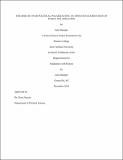The Debate over Political Polarization: An Updated Examination of Public Polarization
Author
Stamper, Julia
Abstract
Political polarization of the public has been the topic of academic debate for decades. Some claim that the polarization is concentrated in party elites and perpetuated by the media (Fiorina, Abrams, and Pope 2011). Others claim that there is widespread polarization of the public (Abramowitz 2013). Using the ANES Time Series 1948-2106 I find evidence that polarization does extend to the mass public. A higher proportion of party identifiers are more likely to identify at the tail ends of the ideological spectrum, the scales showing policy preference, and the feeling thermometers towards presidents and the opposite party. The mean response for all three scales mentioned has also moved farther and farther towards the extremes and the gap between Republicans and Democrats has grown, or in some cases developed and grown, and grown at a higher rate in the last 10 years. The multi-variate analysis provides further evidence for the separation between party identifiers and indicates that demographic factors do not affect individuals’ policy preferences as much as their party identification. In short, the American public has become increasingly polarized along party lines with both strong and weak party identifiers having sizeable gaps in opinions when compared to their opposite party counterparts.
Subject
Date
2018-12-13
Citation:
APA:
Stamper, Julia.
(December 2018).
The Debate over Political Polarization: An Updated Examination of Public Polarization
(Honors Thesis, East Carolina University). Retrieved from the Scholarship.
(http://hdl.handle.net/10342/7097.)
MLA:
Stamper, Julia.
The Debate over Political Polarization: An Updated Examination of Public Polarization.
Honors Thesis. East Carolina University,
December 2018. The Scholarship.
http://hdl.handle.net/10342/7097.
April 26, 2024.
Chicago:
Stamper, Julia,
“The Debate over Political Polarization: An Updated Examination of Public Polarization”
(Honors Thesis., East Carolina University,
December 2018).
AMA:
Stamper, Julia.
The Debate over Political Polarization: An Updated Examination of Public Polarization
[Honors Thesis]. Greenville, NC: East Carolina University;
December 2018.
Collections
Publisher
East Carolina University

